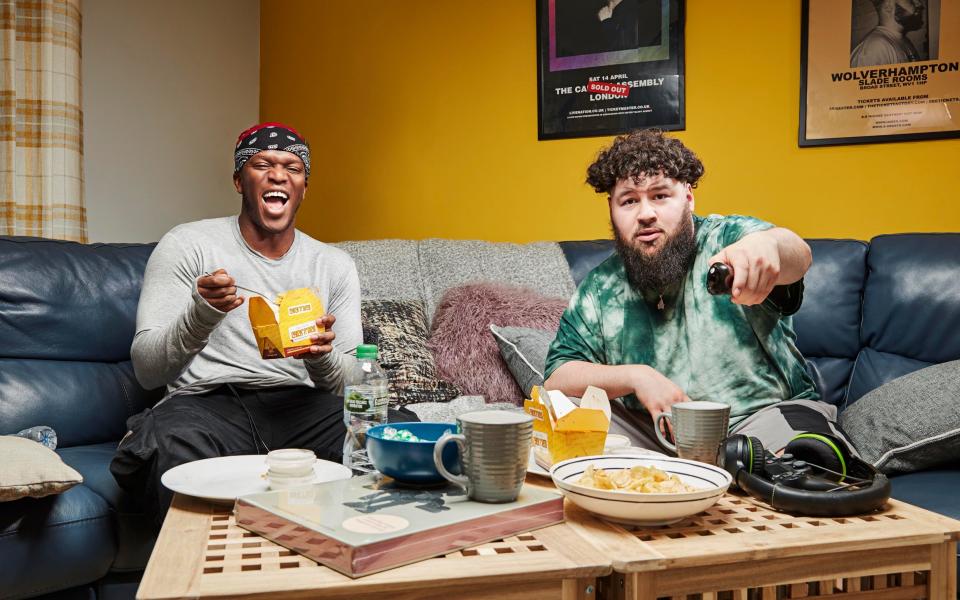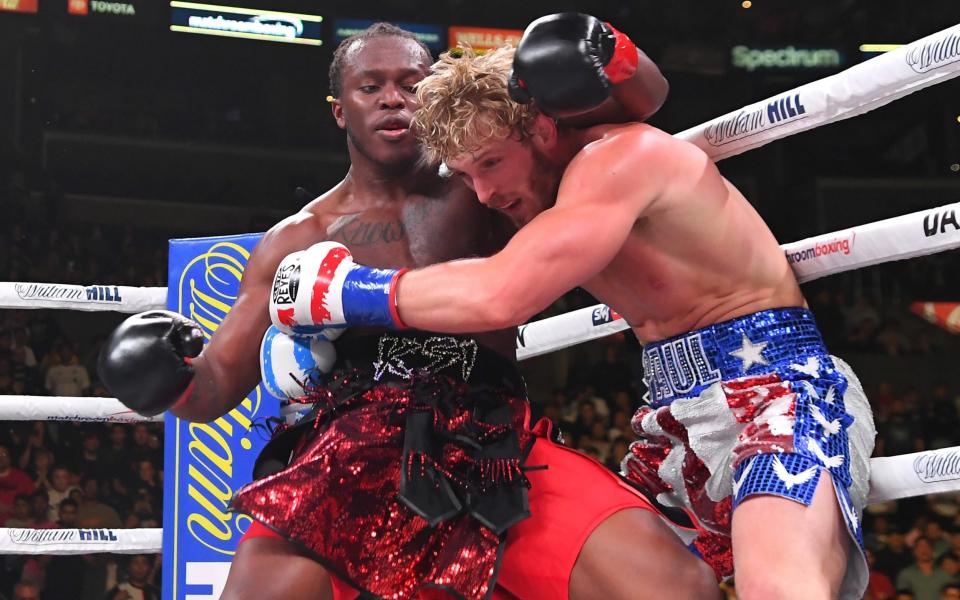KSI: 'I don’t rap about killing people or doing drugs – I’m clean and work hard'

He’s been described as one of the most prominent figures on the internet; one of the world’s key influencers (though he hates the term); and a social media phenomenon – which is hard to argue with. But unless you are under 30, or are watching the current series of Channel 4’s Celebrity Gogglebox in which he appears, you may be unfamiliar with KSI.
Ask a young person and they’ll tell you exactly who he is. Real name Olajide Olatunji and known to his friends as JJ, the British 27-year-old is one of the most popular YouTubers in the world. And also a boxer. And a singer. Oh, and an actor.
In short, he defies categorisation, though YouTube is where his career started and continues to flourish. His main YouTube account, where he posts videos of his music, of himself reacting to other stuff on the internet, and of himself playing video games and doing skits and pranks, has 21.6 million subscribers. His videos have racked up some seven billion views.
Sound impressive? We're just getting started. Last month he released his debut album, Dissimulation, which shot to number two in the official UK music charts. This surprised even him: “If you told me two years ago I was going to have a number two album in the UK, I would have laughed,” he says.
But YouTubers doing music – and, in cases like his, doing it well – seems to be a crossover that's here to stay. The boundaries and barriers to entry have been well and truly broken. “Back in the day there would be gatekeepers when it came to movies or music,” he says. “If they [didn’t] like you... you [couldn’t] enter that industry. YouTube has bypassed all of those gatekeepers and allowed you to create your own fanbase and essentially be whatever you want.”
It’s democratic and, for some, extremely lucrative. KSI’s net worth is estimated at somewhere between £12 million and £20 million. But he attributes his remarkable success to hard graft more than talent.
“I’m a normal hardworking person who has taken opportunities in my life,” is how he modestly puts it when we chat via video call before the release of his latest single, Killa Killa. “I don’t see myself as anyone special. I don’t see myself as made for this.”

Some of his video output looks easy to produce, though clearly isn’t: if it was, we would all be equally successful YouTubers. But KSI – which stands for Knowledge, Strength, Integrity – is also a genuinely talented rapper (he’s been making music for years), and someone who can certainly handle himself in the boxing ring. His first fight against American YouTuber Logan Paul, at Manchester Arena in 2018, was watched live online by 2.5 million viewers and had 19 million subsequent views, making it the biggest internet event ever.
For those who aren’t digital natives, the numbers can seem hard to fathom. So can some of the content. Depending on your age and disposition, it could either seem hilarious or juvenile; entertaining or inane. But older generations rarely understand the appeal of their children’s or grandchildren’s idols, and perhaps that is how it should be.
Anyhow, the JJ I speak to is more reflective than the KSI persona you see in many of his videos. He is at once thoughtful, engaging and open.
“In person I guess I’m quite quiet,” he laughs. “Obviously in my videos I’m a lot more expressive and loud and because I’m used to talking to the camera and I’ve been doing this for years, it just comes quite easy for me.”
He’s been doing it – by which he means posting videos of himself on YouTube – for more than 10 years now, having started as a teenager while at private school in Watford. At first the videos were of him playing FIFA. He never set out to be famous. “[I was] very introverted,” he says of his schooldays. “I didn’t know how to talk to girls. I was a right nerd. I was in the loser group. I didn’t know how to really talk to anyone, I kept to myself and it was quite nerve-wracking as well: I was one of two black people out of the whole school.

“Over time I found friends who were also seen as losers but... I wouldn’t have it any other way because it allowed me to venture into YouTube and find another community of people that like posting games online.”
His Nigerian parents were strict. They wanted him to become a doctor. He never went clubbing; never even went to sleepovers with friends.
But gradually his online following grew until, by 18, he was reportedly earning £1,500 a month from his videos. “I found passion in YouTube and made content to entertain, and it excited me," he says. "It also worried me because I knew my parents weren’t going to be for it. It took a year of convincing [them] before they finally allowed me to do what I wanted to do, and now they’re proud.”
As well they might be. The internet allowed him to find a community and a vocation, and to branch into anything he wanted to. He says he’s met fans of his as young as seven and as old as 50.
But being high profile on the internet can attract abuse, often of a racist nature. “I’ve always had people being racist to me online,” he says. “I’ve just grown up with it and got used to it and have got to a point where I can just laugh it off. My view is if someone wants to be racist towards me I shouldn’t give it attention, I can just laugh it off and give them no power. If they want to say the n-word to me and I react in a certain way, it in a sense gives them power over me. But if I just ignore it and move on with my day I show I’m the bigger person.
“Especially back in the day, YouTube was a very racist place but... I would always just put my head down and keep moving forward... and showing the haters or racists how through success I can rise above it all. And I’m in a happy place because of it.”

He is well aware his situation isn’t the same as everyone else’s, however, and strongly supports the Black Lives Matter movement, which he credits with opening people’s eyes to the extent of racial inequality. “As a black person I always felt like I knew I had to work harder than a white person,” he says. “This whole movement has allowed everyone to see that a lot of black people were hurting and a lot of situations are really not in black people’s favour. It’s allowed people to see us as proper people that have been oppressed.”
He is characteristically optimistic that things are now slowly improving. “I feel like we’re finally reaching that point where black lives are starting to matter. We’re making strides in the right direction. It’s going to take time, it’s not going to be a quick fix thing.
“We just want justice, that’s it, and yeah, we’d better get it,” he laughs.
Although he gets labelled an influencer, he thinks the term itself is meaningless. Yet undeniably he wields great influence, and recognises now that with it comes great responsibility. He tries to guide his audience to believe in themselves, he says. So if your children or grandchildren are following him (which they probably are), rest assured he takes seriously the need to be a good role model.
“I don’t rap about killing people, I don’t rap about doing drugs,” he says. “I don’t do drugs. I’m just clean and work hard and I train. I try and push that towards my audience.”
Killa Killa from KSI’s debut album Dissimulation is out now


